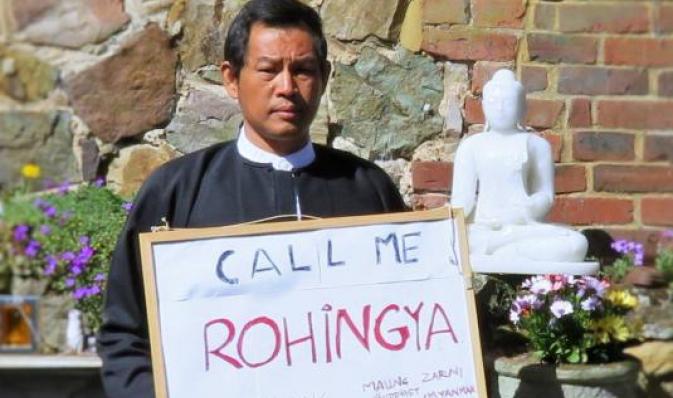
Published by Transcend Media Service on April 23, 2018
As Burmese activists and scholars – not mutually exclusive categories as many in the so-called Ivory Tower are misguided to think – monitor Burmese language social mediascape, we are frightened by the unmistakable parallel between Hitler’s Munich and Nuremberg in 1930’s and today’s Myanmar insofar as the prevailing public opinion.
But there is a serious problem with “public opinion”.
The age old problem of ‘who is the public’, and how is its opinion formed must be asked.
“Public opinion” is typically manufactured, to a very significant extent, in the age of mass media – whether through the then pioneering radio broadcast and large circulation newspaper outlets of Nazi Germany or Facebook and on-line media outlets of 2018 Myanmar, or paid, political ads as in the cases of American electoral politics.
Facebook may be the tool all too loosely controlled on matters of ‘hate speech’, but there are invisible and visible networks and organizations – such as the Ministry of Defence and its Division of Public Relations popularly known as “Psych-War Division” run by my contemporaries and old friends and contacts – that optimize the uses of Facebook to turn an otherwise decent people into abominable lot of genocide-cheer-leaders and executioners.
But whatever, whoever is shaping the public opinion in today’s Myanmar anyone monitoring genocidal discourses in the public domains in Burmese language cannot fail to notice the Nazi parallel: Myanmar public, in my assessment, is in the mental world of the Nazis. I don’t use this word lightly – and for the effect.
All influential sectors or pillars of Myanmar’s society and what academics call “state” – assemblage of institutions, networks and mechanisms designed to whip and control people in line with the economic, political and ideological interests of religious, commercial, military and political elites – are both themselves Fascist, and they have effectively turned the public at large – into Islamophobes and specifically Rohingya-haters, killers and cheer-leaders of Myanmar’s official destruction of the Rohingyas as an ethnic community.
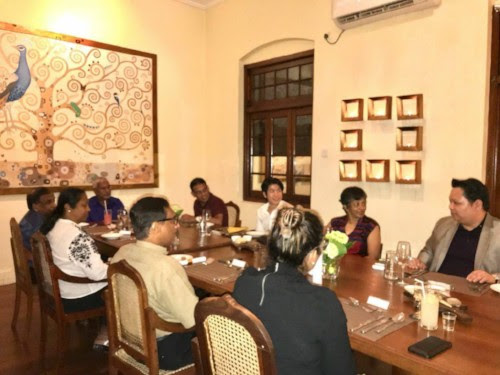
In the picture above the British (SOAS)-educated Aye Ne Win, the oldest grandson of the late despot General Ne Win who was the unchallenged supreme commander of the armed forces in Burma since Feb 1949 till he publicly resigned in July 1988, was seen as hosting a dinner party for the visiting Sri Lankan Attorney General at Rangoon’s Bayleaf restaurant a few nights ago.
Despite the anti-poor biases on which the discourses of anti-terrorism and genocides are anchored, genocides, war crimes and crimes against humanity are the things of the elites.
Just as Hitler’s circle was made up of Harvard-Humbolt PhDs and “lesser” credentialed German elites Myanmar’s genocidal elites are no less educated: Suu Kyi herself is famously Oxford-educated, and speaks English with a posher accent than the Queen of England.
As recent as March in Sydney’s ASEAN Summit, Suu Kyi’s dishonest tales of “centuries of conflicts” between Muslims and Buddhists are repeated, mindlessly, by the likes of Singaporean and Australian Prime Ministers – both poshly educated at Oxbridge.
The intellectual and military classes of the Burmese that today help justify, bleach, plan and execute have, at minimum, the Defence Services Academy 4-years elite schooling, and optimally trained at Harvard, Cambridge, Georgetown, Oxford, Australian National University and so on.
So I always roll my eyes when the disingenuous official policy statements from UN and governments harp on how the competition over land and scarce resources, and religious disharmony in Rakhine has brought us all to where Burma is today: a textbook example of genocide.
The verifiable fact is this: the poor commit street crimes for survival while the well-fed, well-educated elites commit suite crimes, specifically international state crimes worthy of Nuremberg and today’s ICC.
Heard of “regime change”, ‘legality”, ‘the red line”, etc???
The elite-run Sri Lanka and Myanmar give rich and grotesque raw materials to anyone with an interest in writing future real life horror stories. My suggested working title: “The Tales of Theravada Buddhist Genocide”.
I was involved as a member of the Permanent Peoples Tribunal on Sri Lanka which found the Sinhalese-Buddhist controlled State of Sri Lanka guilty of genocide and war crimes against Eelam Tamils.
Genocides are far more pervasive than the Court and the lawyers are prepared to recognize.
As with my own country’s “Buddhist” genocide, it is still on-going – at a different pace after the last wave of mass terror.
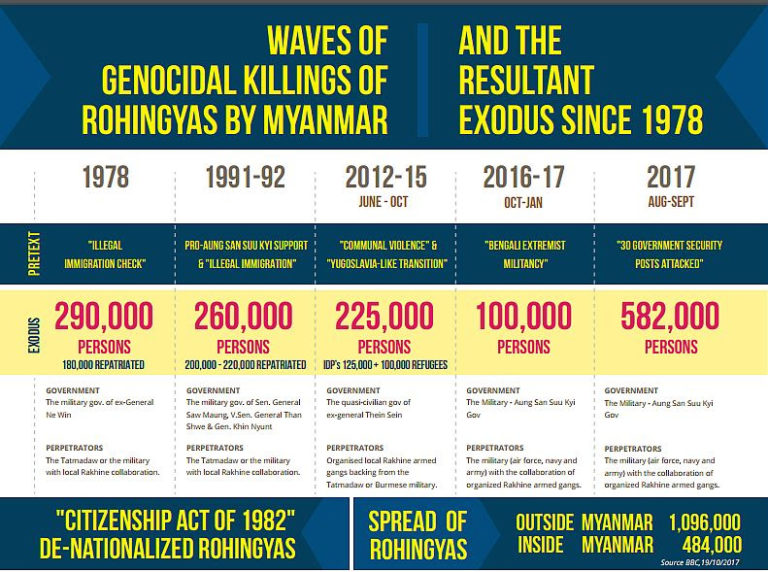
As Myanmar’s military leader Senior General Min Aung Hlaing put it, (Rohingya presence) in Myanmar is “an unfinished business”. It then goes without saying that the genocide is the Finished Business.
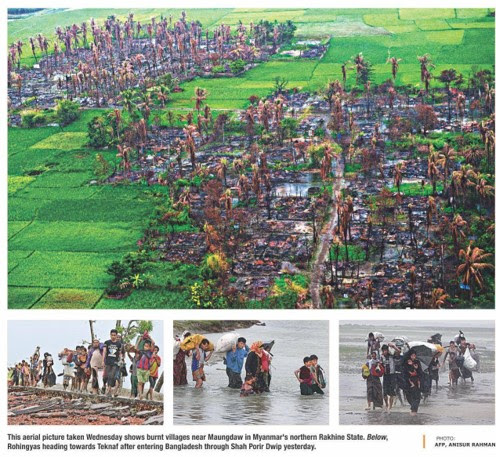
While the British government – and many legally-minded international players – continue to express, rather conveniently, their confidence in the Court as the final arbiter as to the nature of Myanmar’s persecution of Rohingyas – genocide, crimes against humanity, war crimes, whatever – by the time the Court arrives Rohingya presence has been bulldozed completely.
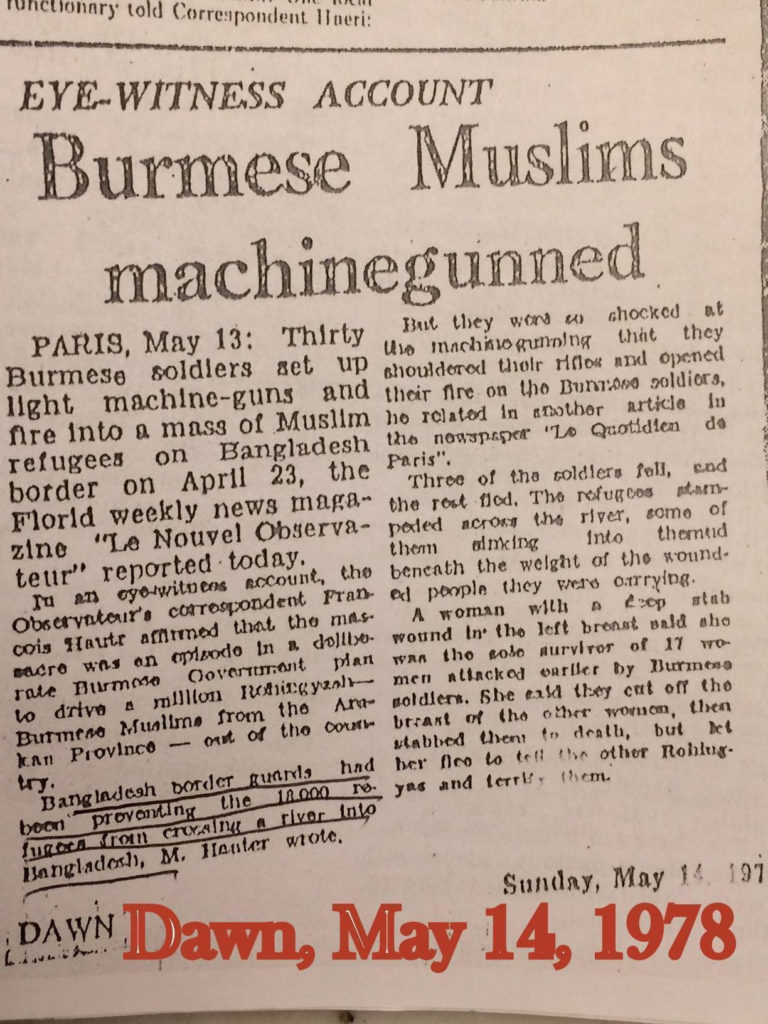
There are four types of Rohingya presence inside Myanmar and across the 170-miles of Burmese-Bangladesh borders: 200,000 IDPs in camps since the tout-bouts of organized violence largely against the Rohingya in June and Oct 2012 – a German official who visited these camps in Rakhine State recently told me and Rohingya blogger they were “concentration camps” -; twice that number in the main remaining Rohingya ethnic pocket called Buthidaung township (or “gourd hill”) from where, according to the UN, they are being starved out slowly and deliberately into fleeing in large numbers – enter ‘boat people’ and the UNHCR’s bleach “irregular movements at sea”; a large ghetto in Sittwe, where George Soros visited and publicly stated that he “heard of the echos of his childhood” in the Nazi-occupied Hungary of 1940’s; and finally the estimated 1 million in Bangladesh’s Cox’s Bazaar which has been on-and-off the sanctuary for the Burmese-persecuted Arakanese (residents of Arakan or Rakhine regions) of all faiths and ethicities including today’s Buddhist Rakhine since the colonization of Rakhine or Arakan region by the Dry Zone Burmese kings in December 1784.
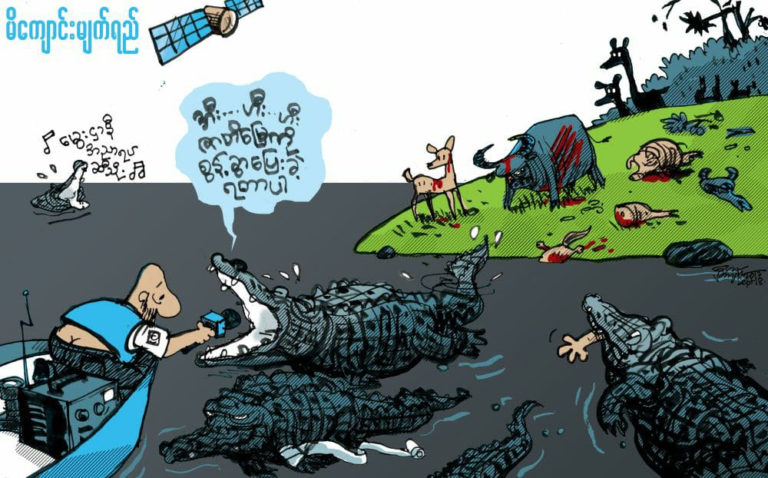
Despite the echos of Islamophobic paranoia about Rohingyas and “Muslim terrorists” expressed by the likes of Bertil Linter this Bangkok Post opinion piece entitled “The minefield of reporting the Rohingya” confirms my greatest fear: the society where I grew up and lived for 25 years has indeed morphed into nothing less than a Fascist society. Yes, there was racism in my town – and in many regions – against the Kalar (or people of Indian origin), a term that was for centuries a high status word because everything good and instrumental in kingdom and society building was NOT indigenous but imported from India: Buddhism, pagoda architecture, writing, law, kingship, ideas, dress, and so on. Indeed Burma, ancient or contemporary, without the Kalar’s ideas would be a collective of Cave Men and Cave Women.
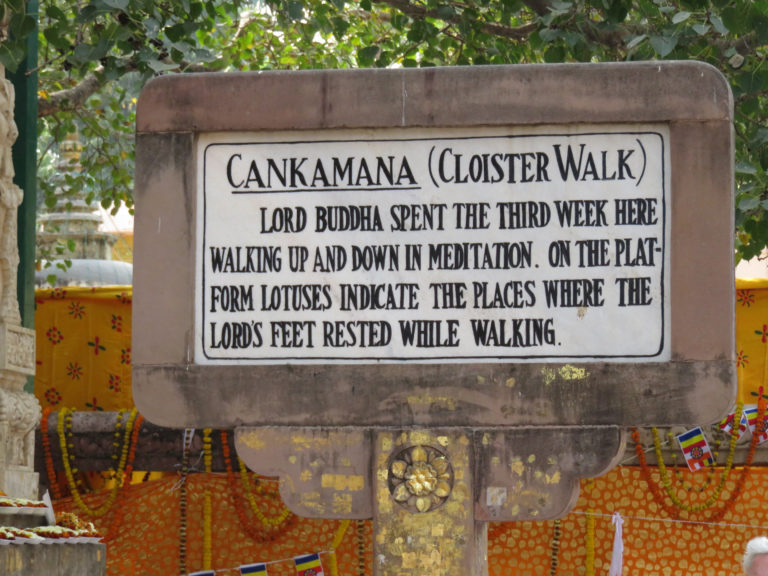
Though sandwiched between two ancient civilizations – India and China – the influence of the ‘chop-stick’ civilization over the evolution of the Burmese society and its institutions is almost negligible.
If we are to go by the social media discourses today’s Burmese are behaving like “Hitler’s willing executioners”. Today in Myanmar we have Hitler’s Mein Kampf available in Burmese translation, but no such public materials as the text of the Genocide Convention of 1948 or the Rome Statute!
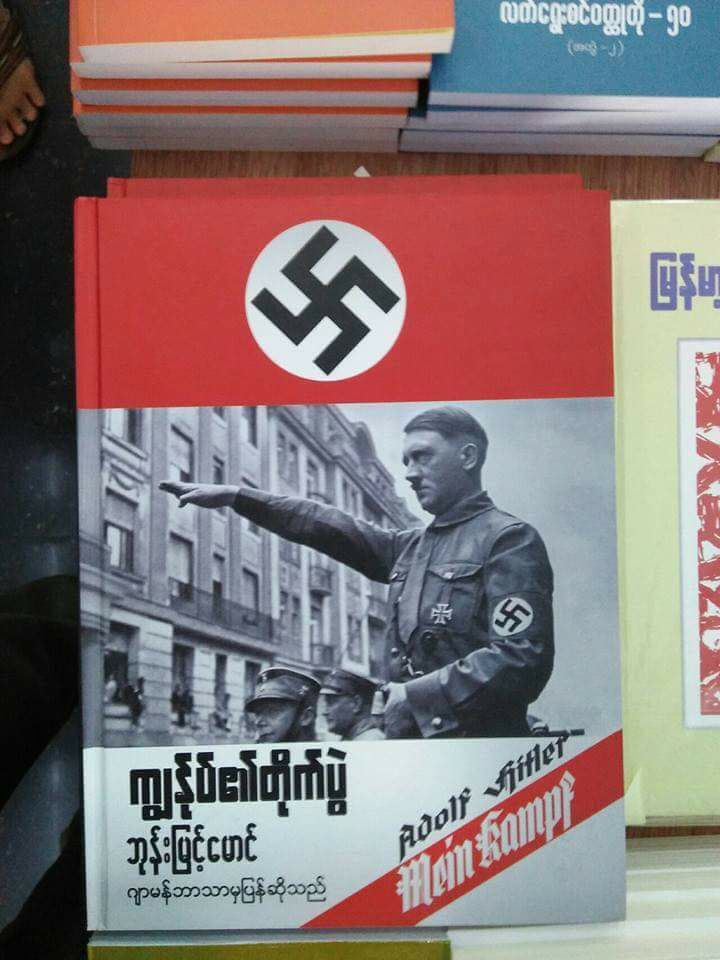
Aung San Suu Kyi, on her part, is far more interested in making a biopic about her martyred father and naming bridges after him in ethnic minority regions where Aung San, my childhood inspiration, is not universally loved or admired than educating the public about these relevant international laws and inter-state treaties.
In her finely written essay “Burma’s Collective Amnesia” in the Atlanic, Alex Wagner, the Burmese-American grand daughter of the late Daw Mya Mya Thant Gyi, who was a contemporary in Pali Honours classes with my late great-uncle in the colonial Rangoon University of 1930’s, admirably outed her beloved late grandmother. As a fellow activist who shared our support for Aung San Suu Kyi and hatred towards the military as our common oppressor, I was well-acquainted with Aunty Daw Mya Mya Thant Gyi. She was soft-spoken, kind and nurturing of exiled Burmese students and dissidents from our generation which grew up under Ne Win’s dictatorship. Wagner minced no word as she dissected and exposed the anti-Kalar racist cancer that her grandmother succumbed to and linked the anti-Indian racism of the Burmese of 1930’s to today’s genocidal racism under the glow of Aung San Suu Kyi’s Nobel Peace prize and the formerly iconic prestige.
After Oama attended her wedding as she was on his communications team, Alex Wagner first came to the attention of the Burmese diaspora and the English-speaking domestic elites, all desperate to feel proud about our own kind and the country that is top in every bad thing. We may be one of the poorest basket cases in the world, but we are proud to be a top 5 refugee producers, or so it feels.
As elites and a society that calls itself “Buddhist”, we have been proven incapable of either peace, literal or mental, or humanistic nation-building. That’s now a well-worn tale, and I won’t repeat it here.
This winter, Natalie and I wrote a historical research essay – Reworking the Colonial-Era Indian Peril – for Brown’s World Affairs Journal, making the same link Wagner made in her above-mentioned essay, but in a non-personalized language.
These days, the Burmese public discourses have gone to the dogs.
Myanmar celebrated its lunar (Hindu-Buddhist/Indian New Year) a few days ago, with its famed Water Festival. In fact, the Burmese word for New Year itself was rooted in Sanskrit – Sinkanda, or the Burmanized Thingyan, or CHANGE.
From a Buddhist perspective change is the only constant, and the Burmese society has changed, for worse: it is recognizable genocidal.
There is little wonder then that Yangon Division authorities approved a cultural performance, a public satirical ritual performance reflecting popular concerns and issues of the day, during which Rohingya women were portrayed as “Begalis” offering up their vaginas as bribes to Myanmar immigration authorities. Equally despicable and grotesque is the portrayal of Professor Yanghee Lee as a woman who carries in her handbag an egg plant, a popular Burmese metaphor for a “dildo”, or an electric penis.
All this is in a political system where a single valid act of mockery of Aung San Suu Kyi or Senior General Min Aung Hlaing would land the ‘offender’ behind bars – for 6 months!
This clip was posted on the Facebook for Myanmar’s cheer-leaders of genocide to get a kick out of it.
Against these prevailing trends there really are NO ‘civil society’ solutions in Myanmar for the foreseeable future: the essence of a interlinked complex of a Fascist public, Fascist regime, Fascist-collaborating organized religion, Fascist intelligentsia and Fascist political class is its inability to self-correct. Try we must. But the solution lies outside.
That is the paradox of a genocidal system: the system creates the problem which it cannot itself resolve.
That is why, analytically and empirically, I for one advocate intervention in Myanmar to end the genocide, to help secure a protected region for the Rohingya, who have nowhere to go, no place to call home, or no piece of earth to which they feel is theirs.
Protected homeland for the Rohingyas is not a romantic ideal, activists’ fantasy. It is NOT even the right of self-determination, or the right of return, much less a new and independent sovereign state, but it is an existential necessity for the survivors of genocide, whose rejection, denigration, exclusion and disenfranchisement by Myanmar – as a state and society – is complete and total.
A Buddhist humanist from Burma, Maung Zarni is a member of the TRANSCEND Network for Peace Development Environment, former Visiting Lecturer with Harvard Medical School, specializing in racism and violence in Burma and Sri Lanka, and Non-resident Scholar in Genocide Studies with Documentation Center – Cambodia. His analyses have appeared in leading newspapers including the New York Times, The Guardian and the Times. Among his academic publications on Rohingya genocide are The Slow-Burning Genocide of Myanmar’s Rohingyas (Pacific Rim Law and Policy Journal), An Evolution of Rohingya Persecution in Myanmar: From Strategic Embrace to Genocide, (Middle East Institute, American University), and Myanmar’s State-directed Persecution of Rohingyas and Other Muslims (Brown World Affairs Journal, forthcoming). He holds a PhD (U Wisconsin at Madison) and a MA (U California), and has held various teaching, research and visiting fellowships at the universities in Asia, Europe and USA including Oxford, LSE, UCL Institute of Education) , National-Louis, Malaya, and Brunei. He is the recipient of the “Cultivation of Harmony” award from the Parliament of the World’s Religions (2015).









